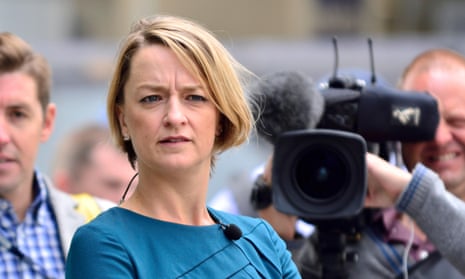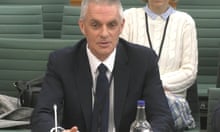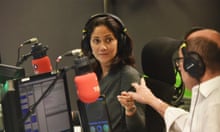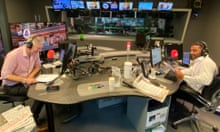Officially, the person who replaces Laura Kuenssberg as political editor will be picked by a team of BBC senior managers and the director general, Tim Davie, on the basis of which journalist is best placed to explain the workings of Westminster to tens of millions of Britons on a daily basis.
Unofficially, Davie and his team will be acutely aware of how Downing Street will view any appointment. With the BBC’s future under constant threat and negotiations over the future of the licence fee still unresolved, they will have to take account of the political currents that surround the appointment of one of the most powerful jobs in British journalism.
Kuenssberg’s expected departure after six years as political editor is yet to be confirmed. Various details, including a potential role on Radio 4’s Today programme, are still being worked out as part of a broad reshuffle of on-air BBC presenters.
Yet her time in the job shows the enormous challenges that come with being the BBC’s political editor in an era when the nature and purpose of Westminster journalism is changing. There is more scrutiny of how political coverage works in the UK – and whether it should work like it currently does – than ever before.
When the former Downing Street aide Dominic Cummings said Kuenssberg was the only reporter he spoke to regularly because of the broadcaster’s “special position” in shaping the news agenda, he was stating something that seemed obvious to him. In a previous era, being the only reporter with access to Downing Street would be a massive boon for a political editor. Yet nowadays such access can be seen instead as a potential liability when trying to build trust with audiences.
Kuenssberg also showed there can be a big difference between feeding the traditional BBC news machine – through radio broadcasts, television news packages and the articles on the BBC’s website – and the urge felt by most journalists to reach new audiences on social media.
She first became a household name with her constant presence on the BBC’s rolling news channel during the 2010 general election and her use of a then-new social network called Twitter. Her decision to provide insider updates to her 60,000 followers – considered a highly impressive number at the time – was considered an innovation.
Over the following decade the nature of Twitter changed, with the risk that a loosely phrased tweet reporting a piece of gossip could derail the main journalistic work. It also enables enormous scrutiny of every line in every report. The rush to tweet caught out Kuenssberg and ITV’s political editor, Robert Peston, during the 2019 general election when they both reported false claims, fed by a Conservative source, that a Tory activist had been punched in the face.
Davie has said he is staking his reputation and the BBC’s future on enforcing impartiality, especially when it comes to news reporting. Exactly what this means can be less clear in reality.
Impartiality in the world of BBC news reporting often used to be seen as an issue of left versus right, with a broad BBC view that political coverage would typically include the government’s view, the opposition’s view, and sometimes a third party’s take. Now it involves weighting the viewpoints of remain supporters against those of Brexiters; Tory MPs from red wall seats wanting government funding against pro-market Conservatives; and fans of Keir Starmer’s Labour leadership against Corbyn loyalists.
Staff working on the Millbank-based political team recount endless pressure and quibbles from the government over minor news stories, and disputes over how individual reporters’ tweets are phrased.
But it can be unclear which topics are considered to be beyond debate in the world of the BBC. Some, such as whether climate change is happening or whether gay rights are a good thing, are not going to result in reprimand. What is less clear for staff is whether others, such as public support for transgender rights or backing for the Black Lives Matter movement, count as breaches of impartiality guidelines.
Potential internal candidates to replace Kuenssberg include the returning North America editor, Jon Sopel, the economics editor, Faisal Islam and more junior political correspondents such as Vicki Young, Adam Fleming and Chris Mason.
Whoever gets the job, the hiring of the new BBC political editor plays into the bigger question facing the national broadcaster in this era: whether it is possible for a single broadcaster – and a single political editor – to meet its mission of serving everyone in the UK, at a time when fragmented audiences increasingly embrace content fitting their particular niche interests and political views.








